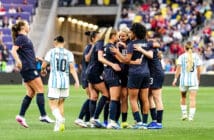 Tanya Arnold has paved the way for the new generation of female representation in the sporting media and Rugby League.
Tanya Arnold has paved the way for the new generation of female representation in the sporting media and Rugby League.
As a southerner, Rugby League was something Tanya had to learn and pretty quick when she joined the BBC Radio Leeds sports desk
“You can’t do sports in this part of the world without Rugby League”
Rugby league is renowned for being an all-inclusive, welcoming sport and she found this to be true while she found her feet in the sport. Tanya has gone from strength to strength in the sport.
“It’s been a fabulous sport to work in, its given me more opportunities than I could ever dream of, so I’ve got a lot to thank it for.”
When she started her journalism journey there were no female sports presenters on any level, so she did not think it would be a direction her career would take.

(Picture : the super league show facebook)
In 2012 she joined the Super League Show, and she hasn’t looked back. She has seen the growth of the women’s Super League from the very beginning and praises the professional teams, taking the women’s game seriously and taking them under their wing, and from her side, the Rugby League media team have done the same to her.
“I’ve been very fortunate with the presenting of Rugby League with who I’ve had around me, because if the team is not as supportive and as good as teams I’ve had, you can be hung out to dry I should imagine.”
Although she hasn’t met many obstacles in the way of proving herself, being in a predominately male-dominated industry she admits that she had to prove it to herself.
“If I’m being brutally honest, all the way through my career, I’ve had to prove to myself that I can do the job, as much as proving it to anyone else.”
Looking forward to the new format for the 2022 Women’s Super League being split into two leagues, Tanya agrees with the reasoning behind it to keep the intensity for the top teams.
“It needs to be competitive, its not good for the game to have fifty-eight nil scores. It’s not good for the players when you’re trying to build to a World Cup. They need to be in tight, competitive games as often as possible. I think the more competitive the games are the better, particularly looking to the World Cup. The England cohort of players need to be in tough, pressurised as often as possible to prepare them.
France cannot be overlooked either, considering they hadn’t played Rugby League for almost two years they put up a competitive and physical effort against England in October.
With the full coverage of all the games, it is a massive opportunity to showcase the women’s game to a wider audience. Tanya adds.
“I’m looking forward to the crowds, big crowds to watch the women’s game. I’m looking forward to people seeing it and realising how good the women’s game is”
“There’s got to be money coming in, but it shouldn’t cost women to play Rugby. The first thing that needs to change is that women should not be out of pocket to just train and at the moment they are.”
To grow the game there needs to be more coverage and exposure, with growing coverage other avenues can be explored, such as a Women’s Super League highlights show. There’s no denying that the women’s game has grown quickly in a relatively short space of time, but there is still a long way to go. However, in the current climate of Rugby League, there is doubt that it is possible right now for those avenues to be explored.
“It’s a strange thing in terms of where it is at, at the moment because there so much enthusiasm and optimism, quite rightly behind it. It has grown quite quickly, but there’s still a very big step to go and I’m not sure yet whether Rugby League itself is in a position to let that happen, across the boards, let alone with just the women.”
The interest and coverage of the World Cup could be a pivotal income, not only monetary value but also in terms of the growth and interest in the game. The sport has the potential to be bigger and better right across the board.
Follow us on Twitter @ProstInt
![Prost International [PINT]](https://prostinternational.com/wp-content/uploads/2021/08/PINTtFontLogoRoboto1536x78.jpg)


